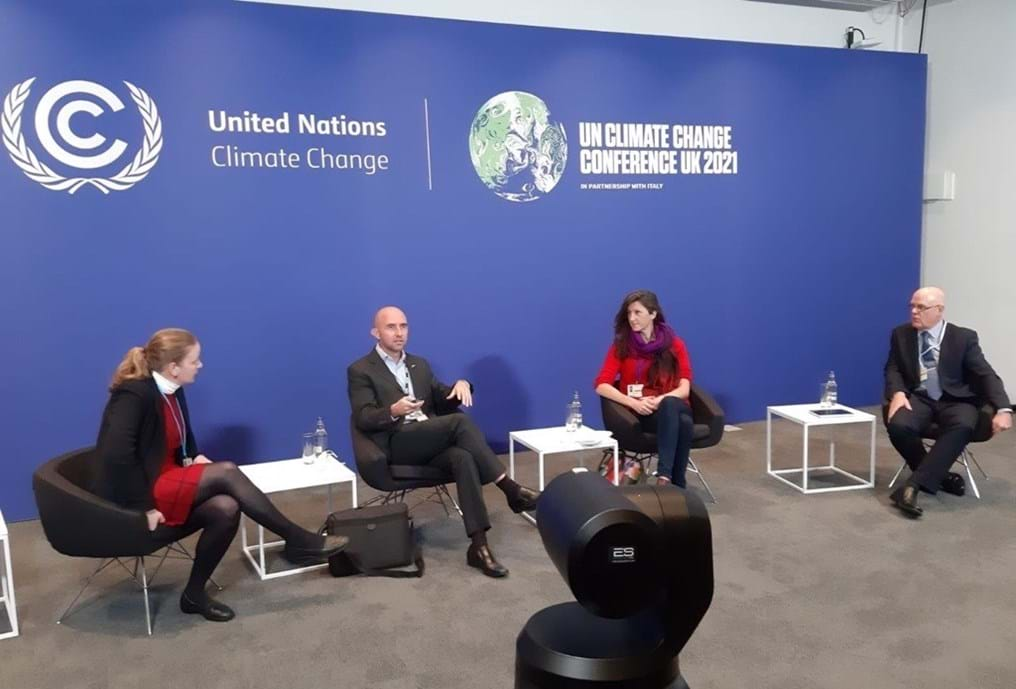GUEST BLOG: From COP21 to COP26

4th November 2021
In December 2015, IChemE Fellow Stefaan Simons attended COP21 in Paris. Six years later he is in Glasgow for COP26 and shares his experiences of attending the pivotal climate change conference, explaining the progress IChemE has made with respect to climate change during that time.

Name: Stefaan Simons
Job title and organisation: Emeritus Professor of Energy Systems at Brunel University London and Visiting Professor at University College London
IChemE role: Founding chair of the IChemE Energy Centre, now the Energy Community of Practice, of which he sits on the leadership group. Holder of the IChemE Trustees Medal.
Bio: After a successful career in academia, Stefaan took early retirement in 2020 to focus on helping energy-related start-ups and advising the further education/higher education sector on skills development with regards to Industry 4.0/Digitalisation. He is the director of innovation at Gridport Developments, a start-up company providing grid balancing services to corporate energy consumers.
In December 2015, I was given the opportunity to attend COP21 in Paris to represent IChemE. This was a first for me and a first for IChemE, highlighting the Institution’s increased focus on climate change. I presented at a side event organised by Imperial College London where we discussed engineering solutions and the systems approach required to achieve decarbonisation.
One of the many advantages of my attendance at COP21 was meeting other engineers involved in addressing climate change, including members of a consortium called Future Climate – Engineering Solutions (FC-ES). This group is a global alliance of engineering institutions working to develop and share good practice in national energy and climate planning, with the objective to reduce greenhouse gas emissions and dependence on fossil energy. FC-ES has developed a good practice framework to help other engineers develop example national energy plans that are realistic and could be adopted to deliver an energy system that aligns with the terms of the 2015 Paris Agreement and emissions reduction.
Since COP21, IChemE has maintained a role in FC-ES and has embarked on its own journey to demonstrate chemical engineers’ contribution to decarbonisation. In 2020, I was part of the core team that led the Institution’s work to develop a position statement on climate change. We were asked by the Board of Trustees to be brave, and I believe we delivered a statement that was both bold and clearly laid out the responsibility of the profession to deliver action on climate change. I was delighted that over 80% of IChemE members supported the commitments within the position statement on climate change, with the statement being well received by all stakeholders.
Together with FC-ES we made a successful bid to present at COP26 to share the approach that the chemical engineering profession is taking to support a transition to a low carbon future for all.
On Wednesday 3 November, I sat down in a media studio at COP26 with representatives from BBC Media Action, the Global Ecovillage Network and the Nordic Folkecentre for Renewable Energy. Along with Alana Collis from IChemE, we discussed the importance of community-driven action for national energy plans and the role of chemical engineers (and wider engineering).
I mentioned the commitments that IChemE has made to support the profession including those in the more traditional and energy intensive industries. There was broad discussion about the role of communities in driving positive change. Within IChemE, our community is the chemical engineering profession. As we set out in the position statement, action must start now. We must work together as a profession but also with others, including governments, industry and wider society.
Chemical engineers can shape change from within. Whatever their role, sustainability and ethical values are embedded in what it means to be a professional chemical engineer. In the transition to a low carbon economy, it is essential to transform skills and competences amongst the workforce and it is vital to support our peers to do that. This clearly applies to those working in traditional sectors, including oil and gas, where there is still a need for the product, but also an opportunity to improve the upstream and downstream processes to reduce the environmental impact.
Later in the week at COP26, at an event in the Nordic Pavilion (6 Nov 1600-1700 GMT), IChemE will share learnings from the work to produce a UK National Energy Plan (using the FC-ES framework) – an activity with significant contributions from IChemE members.
IChemE will also present an event at the Danish Pavilion (5 Nov 1300-1400 GMT), in collaboration with the Danish Society of Engineers and FC-ES. This will look at the importance of skills in the energy transition. This is both in terms of equipping current and future engineers with the skills to work in low carbon industries but also supporting those in traditional sectors such as oil and gas, both to reduce the impact of that sector while it remains part of the energy system and then to support the workforce to transition away from it. This approach is embedded in the IChemE position on climate change and is central to the work to deliver on its commitments.
Six years on from COP21, I hope that COP26 ends with agreements that will enable action, and actions that begin immediately rather than in decades from now. As chemical engineers, we must take action now, and from reading the action plans developed by the IChemE special interest and members groups, it is evident that our profession is playing our part. Let’s hope in another six years, the next guest blog will have more progress to share.
For more information on IChemE's COP26 activities, please visit www.icheme.org/cop26 or follow #ChemEngAtCOP26 on social media.
Photo (left to right):
- Alana Collis, IChemE and Future Climate Energy Solutions (FC-ES)
- Colin Spurway, BBC Media Action
- Anna Kovasna, Global Ecovillage Network
- Stefaan Simons, IChemE